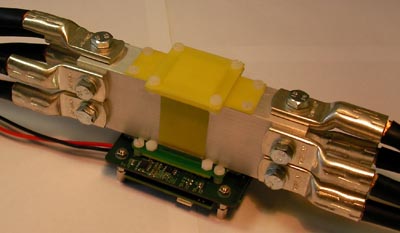Just last month Swiss and Dutch scientists pushed nanotechnology to the max, developing a noiseless nano all-electric car, comprised of just one single molecule, shown here!
Ireland’s Tyndall National Institute is pioneering potentially groundbreaking research on energy-efficient nanoelectronics for electric cars. Its silicon-based sensor that halves energy consumption in EVs is set to go to market in 2012.
Last week, the EU-wide ENIAC Joint Undertaking awarded Tyndall the overall winning project ‘Nanoelectronics for an Energy Efficient Electrical Car (E3Car)’.
The institute scooped its 2011 Innovation Award for its nanoelectronics research that is demonstrating 35pc energy savings, lower costs, improved reliability and shorter time to market by introducing innovations at component and sub-system level, some of which are being adopted in real-life applications as early as in 2012.
Dr Kafil M. Razeeb from Cork led the Tyndall energy-efficient electrical car project.
“My team was involved in the development of novel electromagnetic field sensors to be used in power train monitoring of the next generation of energy-efficient cars,” explained Razeeb this morning.
“This is the first silicon-based sensor that requires only half the power consumption compared to the current state-of-the-art. Moreover, it monitors the longest current range compared to any other silicon-based sensors. This significantly simplifies the integration of sensors for car equipment OEMs,” he added.

Current sensor system for an electric vehicle developed at Tyndall National Institute
Enhance cooling performance
Furthermore, the Tyndall team is also involved in developing novel nanocomposite interface materials to enhance cooling performance and reduce system complexity through advanced packaging of the SiC devices produced in the E3Car project.
Tyndall went on to win second and third place for posters that depict its research projects at the ENIAC Innovation Awards expo.
eGo
The first one was eGo, a project that is developing a technology to allow touch-activated secure, wireless communication between objects.
Razeeb said this technology will ultimately lead to the possibility of eliminating the need for passwords and PIN numbers for transactions because the eGo configured computer in the system will recognise the user as the owner of the account and will give you access to it.
The EU-wide E3Car project won third place. Dr Alan Mathewson, head of the Heterogeneous System Integration group at Tyndall, said the team was “delighted” to be acknowledged for its work on this project amongst the 60 other projects showcased at the Innovation Awards.
“My team are working together with Dr Kieran Delaney in CIT and some Irish SMEs, such as Lincor and DECAWAVE, to build prototype demonstration systems based on the eGo concept,” said Mathewson.
ENIAC
The ENIAC Joint Undertaking (JU) itself is a public-private partnership focusing on nanoelectronics that brings together the ENIAC member states, the European Union and AENEAS, an association representing European R&D actors in this field.
The ENIAC JU was set up in February 2008 and will allocate grants throughout 2013, executing the projects selected for funding till 31 December 2017. The total value of the R&D activities generated through this partnership is estimated at €3bn.